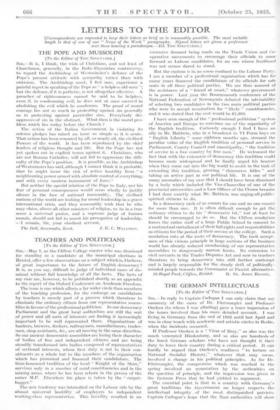LETTERS TO THE EDITOR [Correspondents are requested to keep their
letters as brief as is reasonably possible. The most suitable length is that of one of our " News of the Week " paragraphs. Signed letters are given a preference over those bearing a pseudonym.—Ed. THE SPECTATOR.]
THE POPE AND MUSSOLINI
[To the Editor of THE SPECTATOR.] SIR,—It is, I think, the wish of Christians, and not least of Churchmen, generally, in the Halo-Abyssinian controversy, to regard the Archbishop of Westminster's defence of the Pope's present attitude with sympathy rather than with criticism. The Archbishop must, I feel sure, experience a painful regret in speaking of the Pope as " a helpless old man "; but the defence, if it is pathetic, is not altogether effective. A preacher of righteousness cannot be said to be helpless, even if, in condemning evil, he does not at once succeed in abolishing the evil which he condemns. The proof of moral courage lies not so much in protesting against sin generally as in protesting against particular sins. Everybody dis- approves of sin in the abstract. What then is the moral pro- blem which lies today before the Church ?
The action of the Italian Government in violating its solenut pledges has raised an issue as simple as it is acute. That action has been censured by all, or nearly all, the civilised Powers of the world. It has been reprobated by the chief leaders of religious thought and life. But the Pope has not yet spoken out in explicit terms against it. Christians, who are not Roman Catholics, will not fail to appreciate the diffi- culty of the Pope's position. It is possible, as the Archbishop of Westminster has said, although I cannot think it is probable, that he might incur the risk of active hostility from " a neighbouring power armed with absolute control of everything, and with every modern instrument of force."
But neither the special relation of the Pope to Italy, nor his fear of personal consequences would seem wholly to justify silence ill the face of national immorality. • The civilised nations of the world are looking for moral leadership in a grave international crisis, and they reasonably wish that he who may claim, above all other ministers of religion, to be in a true sense a universal pastor, and a supreme judge of human morals, should not fail to assert his prerogative of leadership. —I remain, Sir, your obedient servant,


























































 Previous page
Previous page